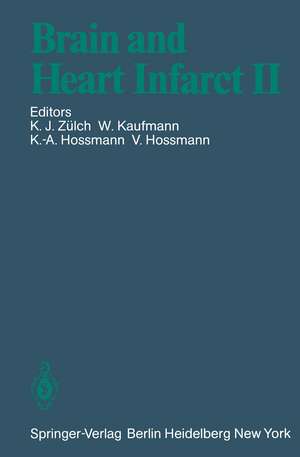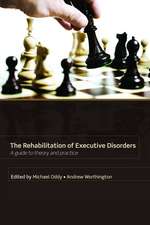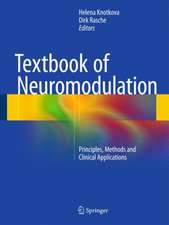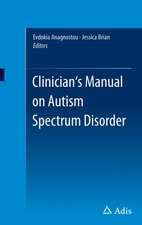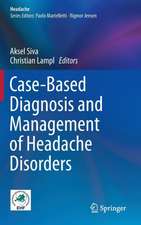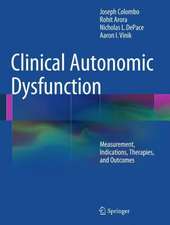Brain and Heart Infarct II
Editat de K. J. Zülch, W. Kaufmann, K.-A. Hossmann, V. Hossmannen Limba Engleză Paperback – 14 noi 2011
Preț: 721.19 lei
Preț vechi: 759.15 lei
-5% Nou
Puncte Express: 1082
Preț estimativ în valută:
138.04€ • 149.100$ • 116.03£
138.04€ • 149.100$ • 116.03£
Carte tipărită la comandă
Livrare economică 21 aprilie-05 mai
Preluare comenzi: 021 569.72.76
Specificații
ISBN-13: 9783642673184
ISBN-10: 364267318X
Pagini: 348
Ilustrații: XII, 332 p.
Dimensiuni: 170 x 244 x 18 mm
Greutate: 0.55 kg
Ediția:Softcover reprint of the original 1st ed. 1979
Editura: Springer Berlin, Heidelberg
Colecția Springer
Locul publicării:Berlin, Heidelberg, Germany
ISBN-10: 364267318X
Pagini: 348
Ilustrații: XII, 332 p.
Dimensiuni: 170 x 244 x 18 mm
Greutate: 0.55 kg
Ediția:Softcover reprint of the original 1st ed. 1979
Editura: Springer Berlin, Heidelberg
Colecția Springer
Locul publicării:Berlin, Heidelberg, Germany
Public țintă
ResearchDescriere
Dr. Kaufmann and I wish to welcome you here in Schloss Auel to this second symposium on brain and heart infarct. We have chosen this lovely castle because I am always dissatisfied with meetings in great hotels in cities, where we rush to and from the meeting rooms. I had such an experience overseas just 3 weeks ago from 8 o'clock in the morning until 10 o'clock at night. We want you to feel some of the wonderful atmosphere of the Bergisches La~d. Moreover, we wanted like you to enjoy a bit of the spirit of the Rhein valley and the 2000-year-old city of Cologne, even at the expense of losing a few hours of discus sion; though this may be a quantitative loss, we feel sure that the environment of this city will stimulate our discussions. Two years ago we gathered here in Schloss Auel for the first time, attempting to conduct a discussion between neurologists and cardiologists on the similarities and dissimilarities of circulatory disorders of the brain and heart. We are happy to continue this discussi?n in the days to come.
Cuprins
Epidemiology of Coronary Heart Disease.- Pathogenesis of the Lesions of Atherosclerosis.- Local Factors Contributing to the Pathogenesis of Atherosclerosis.- Quantitation of Coronary Arterial Luminal Narrowing in Coronary Heart Disease.- Predilection of Cerebral Atherosclerotic Stenosis: a Morphologic and Radiologic Demonstration.- Development and Regression of Experimental Local Carotid Atheromatosis in Rabbits.- Turbulence Generation in Stenotic Blood Vessel Models.- Hemorheology and Ischemia.- Ultrastructural Changes in Acute Myocardial Ischemic Injury.- Ion-Selective Electrodes in Cardiac Ischemia.- Water Movement in Brain Ischemia.- Pathophysiology of Stroke Edema.- Studies on Experimental Ischemia in Mongolian Gerbils.- Neurovascular Aminergic and Peptidergic Functions in Brain and the Possible Pathophysiologic Role in Cerebral Vasospasm.- Ultrastructural and Biochemical Evidence for Reversibility of Regional Cerebral Ischemia.- Circadian Variations of Hemodynamics and Stroke.- Relationship of Regional Coronary Flow to Mitochondrial Function During Reperfusion of the Ischemic Myocardium.- Significance of Local Tissue PO2 and of Extracellular Cations for Functional and Reactive Hyperemia of Microcirculation in the Brain.- Local Factors Regulating Microcirculation of the Brain.- Coupling of Functional Activity and Energy Metabolism in Brain.- Functional Activation in the Diseased Brain.- Oxygen 15 Inhalation Technique in the Study of Regional Cerebral Metabolism-to-Blood Flow Relationship in Man.- Cerebral Resuscitation After Global Ischemic Anoxia.- Coagulation Disturbances and Cerebral Ischemic Lesions.- High Pressure Autoregulatory Failure in the Retinal Circulation.- Relationship of Cerebral Blood Flow to Neurological Deficit and to Long-term Prognosis of Stroke.- Effect of Adrenergic Blockade on Cerebral Ischemia.- Studies on the Pathogenesis of Ischemic Brain Damage and its Amelioration by Barbiturate Therapy.- Treatment of Hypertensive Myocardiopathy.
